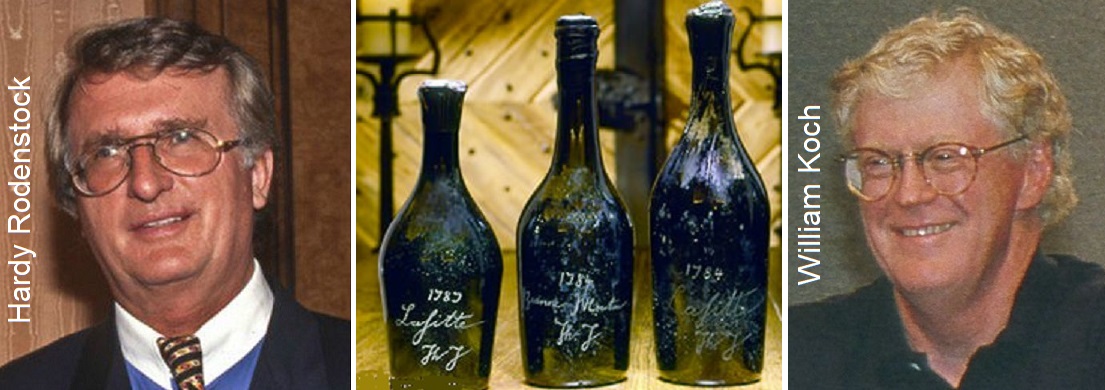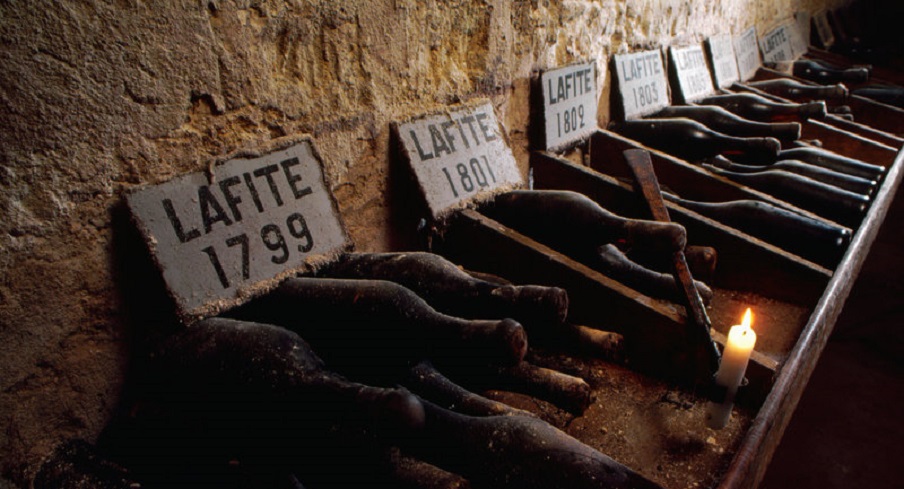The German artist manager and music publisher Hardy Rodenstock (1941-2018) is mentioned in some sources as a member of the well-known Brillendynastie. However, as he himself admitted in the course of the causa cited below, this is a stage name; he was born Meinhard Goerke. In the 1970s, he was the producer of several pop and pop music groups. He is said to have made his fortune with stock market transactions and acquired properties in Munich, Bordeaux and Monte Carlo. After that, he became known worldwide for collecting and trading very old and exquisite wines. According to his own statement, it all began when he uncorked a Château d'Yquem from the 1921 vintage. That was "the starting signal for my passion for great wines". His speciality is the great Bordeaux growths, for which he received honorary citizenship of the city of Bordeaux. He was also considered the owner of the largest collection of old, exquisite Château d'Yquem vintages.
Rarity tastings
He regularly organised wine tastings of rarities, to which only well-known personalities and renowned tasters such as Michael Broadbent (1927-2020), Jancis Robinson (*1950), Robert M. Parker (*1947) and the owner of Château d'Yquem, Comte Alexandre de Lur-Saluces (*1946) were invited. The most famous Rodenstock tasting to date took place from 30 August to 5 September 1998 at the Hotel Königshof in Munich. The incredible amount of 125 bottles of Château d'Yquem, the oldest dating back to 1784 (2 from the 18th century, 40 from the 19th century and the rest from the 20th century) was tasted. During the week, there was a vertical tasting over five lunches and seven dinners, as well as 175 other wines. This tasting is also the subject of a book (August F. Winkler, Yquem - Die Jahrhundert-Verkostung).

Cellar discovery of old vintages of famous châteaux
In the 1990s, Rodenstock presented Impériale bottles (volume of 6 l per bottle) of Château Pétrus from the vintages 1921 and 1922, among others, at several tastings. Initial doubts about the authenticity were expressed by Serena Sutcliffe (*1945), the head of the wine department of the well-known auction house Sotheby's. These doubts were dispelled by the Château Pétrus. These concerns were reinforced by Château Pétrus owner Christian Moueix (*1946). According to his statements, there is no evidence of the bottle oversize in the estate's records, which were usually only used by famous wineries for special clients. However, the winery had been an unknown winery at the time. The most spectacular forgery allegation was for wines from one of the four famous Bordeaux 1855-Premier Cru estates.
In the spring of 1985, according to his own account, Rodenstock received a phone call about the discovery of 12 very old vintages of exquisite wines. These had been found walled up in a cellar wall in Paris. This began a long story of forgery accusations, lawsuits and settlements. The facts could not be clarified 100% beyond doubt until today. The wines in question were from the renowned French wineries Château Lafite-Rothschild, Château Mouton-Rothschild and Château d'Yquem from the 1784 and 1787 vintages from the estate of US President Thomas Jefferson (1743-1826). They bore his initials carved into the bottle glass. Jefferson was US envoy in Paris at the time and collected French wines. Rodenstock, however, never named the place of discovery or the finder who, according to him, had died in the meantime. A Château Lafite-Rothschild 1787 from this find was sold at Christie's auction in 1985 for € 160,000 to Malcolm Forbes (1919-1990). In any case, it is one of the most expensive wines in the world.

Fake Jefferson wines?
In 1988, the American billionaire William Koch (*1940) bought four bottles of Château Lafite-Rothschild and Château Mouton-Rothschild from the vintages 1784 and 1787 for $ 500,000 at the US wine auction house Chicago Wine Company. Koch claims works of art by many important artists (including Cézanne, Dali, Monet, Picasso, Renoir and Rodin) and valuable antiques worth several hundred million dollars as his own. Among them is an exquisite collection of 40,000 wines, some of them very old. The four bottles bore the Jefferson initials in the form "Th.J" and according to the seller they came from Rodenstock. Koch had them examined by employees of the Thomas Jefferson Foundation in Monticello (historic Jefferson winery) near Charlottesville (Virginia). They expressed initial doubts about the authenticity of the bottles, as nothing could be found about these wines in Jefferson's meticulous cellar book records.
Another indication for a forgery is that Thomas Jefferson had always used the initial form "Th:J" (i.e. with a colon) and not "Th.J" as on the bottles in many documents throughout his life. In 1991, a laboratory commissioned by the wine collector Hans-Peter Frericks (a former friend of Rodenstock) proved by radiocarbon dating (C14) that the wine in one of these Jefferson bottles had to date from after the first nuclear tests, i.e. after 16 July 1945. The legal dispute that Frericks then initiated against Rodenstock ended with his conviction in the first instance, but ended in a settlement, the details of which were agreed to be confidential. Another analysis, in turn, showed that the wine definitely came from before the atomic age (i.e. the atomic bombing of Hiroshima and Nagasaki in August 1945), otherwise it would have to contain caesium-137. After extensive analyses in an FBI laboratory, it also turned out that the astonishingly even engraving was most likely made with a technical precision device (perhaps a dentist's drill).
Unsolved mystery
In Koch's extensive collection there are other wine bottles that were allegedly sold by Rodenstock. Therefore, the latter was sued by Koch in New York in August 2006. Rodenstock, however, swore that the Jefferson bottles were genuine and protested his innocence. Moreover, he had never had a direct business relationship with Koch. Individual bottles could very well be genuine (in terms of winery and/or vintage), and some may indeed be fakes. Perhaps in the future it will be possible to establish this beyond doubt with the appropriate means (if there are still bottles). But it will never be possible to clarify whether they really came from Jefferson's estate. For the initials (whether a full stop or a colon) are no proof; they could be the abbreviation for any name.
After a New York federal court provisionally dismissed William Koch's lawsuit against Hardy Rodenstock, the US collector appealed the dismissal. His lawyers introduced new arguments and pointed out that at least part of the so-called Jefferson bottles had been handed over to Koch in New York. Since Rodenstock was the source of all four disputed wines suspected of being fakes, the court would have to declare its jurisdiction after all. Rodenstock denied all accusations of forgery throughout his life. He claimed that Koch had never bought a bottle from him and that it had to be conclusively proven that these four bottles actually came from the Parisian find (see an interview on the Feinschmeckerey website on this subject). In May 2010, a default judgement was issued against Rodenstock because of his absence at a scheduled trial. The facts of the case were never clarified.
Book and film
There have been several TV documentaries on the subject. One of the bottles of Château Lafite-Rothschild Jg. 1787 by Thomas Jefferson described above, which came into the possession of billionaire William Koch in 1988, later became the subject of a book and a film. The US reporter and author Benjamin Wallace wrote the work "The Billionaire's Vinegar" published in 2008 (2012 in German "Im Wein liegt die Wahrheit! The Mystery of the World's Most Expensive Bottle"). Based on this book, the film of the same name "The Billionaire's Vinegar" was made in 2016, starring Oscar winner Matthew McConaughey. See also under Cinema and TV Films and Most Expensive Wines in the World.
Hardy Rodenstock: WINEBerserkers
Bottles: Last Bottle
William Koch: By the America's Cup in San Diego, CC BY 2.0, Link
Voices of our members

As honorary chairman of the Domäne Wachau, it is the easiest and quickest way for me to access the wein.plus encyclopaedia when I have questions. The certainty of receiving well-founded and up-to-date information here makes it an indispensable guide.
Hans-Georg Schwarz
Ehrenobmann der Domäne Wachau (Wachau)